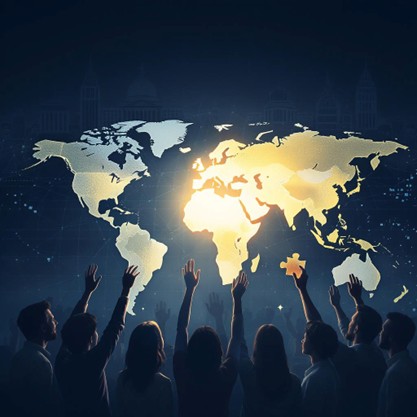The Power of the People: How Citizens Are Shaping Global Politics

We live in a rapidly changing world which is facing serious challenges and crises without precedent. Global conflicts and geopolitical tensions, a worsening climate crisis, growing distrust in institutions and democratic processes, and rising polarization at every level are shaping our reality.
In such a world, based on international organizations, state agreements, and high-level negotiations, the “ordinary citizen” seems to be excluded from major decisions. Most people believe that international politics is only for professionals. But the truth is much more complicated.
Over the past few years, we have seen an increasingly strong presence of citizens in global affairs. From climate and peace movements to pressure on governments to support humanitarian crises and protect fundamental human rights, a new question is emerging:
Can people influence the way international relations are shaped?
Or is this really a job meant only for governments and institutions?
This question is not just for experts. It concerns all of us. In the age we live in, we have the means and the power to influence the decisions that will determine our future. But are we truly ready to take responsibility?
The Rise of Citizen Diplomacy: What It Means and Where It Came From
There is a perception that international relations concern only governments, diplomats, and formal discussions we will never hear about. In reality, ordinary citizens have played an important role in shaping international politics. Over the past decades, a new form of diplomacy has emerged which is conducted not by official bodies, but by ordinary citizens. This form is called citizen diplomacy.
Citizen diplomacy is when people or groups of people try to shape international affairs, promote peace, or raise awareness of global issues, often without holding any formal political authority. These efforts can take many forms: activism, advocacy, humanitarian work, digital campaigns, cultural exchange.
The roots of citizen diplomacy can be traced back to the Cold War, when person-to-person exchanges were used to reduce political tensions between the opposing blocs. But in today’s connected world, it has a wider and more urgent impact. People are finding new methods to get involved in international issues through social media, grassroots movements, volunteering and civil society networks.
Citizen diplomacy fills an important gap in a time when people around the world are becoming more distrustful and dissatisfied with conventional institutions. It reminds us that international relations are not just about national interests, they are also about people and the future we all share.
When Citizens Shape Global Decisions: Real Stories, Real Impact
It’s easy to talk about how citizens might affect international politics, but what is actually happening?
One of the most prominent examples is the global climate movement. A student protest outside the Swedish Parliament turned into “Fridays for Future”, a worldwide movement led by young people that mobilized governments and made climate change a top political issue. Greta Thunberg didn’t hold any formal position. She simply spoke for her future, and millions of people listened to her. International summits and national governments reconsidered their climate policies and revised their agendas.
One more instance is how civil society has shaped the conversation around human rights. Organizations like Amnesty International and Human Rights Watch, powered by thousands of volunteers and everyday supporters, have significantly influenced international functions in the field of human rights and social justice. Their reports and campaigns have reached decision-makers, as well as people all over the world.
Furthermore, digital platforms have created new opportunities. In 2022, when the Iranian regime suppressed women’s rights protests, millions of people around the world mobilized online. The message crossed the borders, raising global awareness and leading the UN and EU to issue statements condemning the crackdown.
Other notable examples showing how ordinary people can influence global politics and decision-making include the Anti-Apartheid movement, the Arab Spring, the Black Lives Matter movement, and the MeToo movement.
Those small actions by individuals from different corners of the world made a real impact. They helped politicians and decision-makers to understand what really matters.
The Power and the Limits of Citizen Influence
The idea that ordinary people can shape international politics is inspiring and offers hope. But it’s also important to understand both the strengths and limitations of citizens’ power.
One of its greatest strengths is visibility. In the digital age, information can be transmitted in seconds, enabling one person’s story to reach people from different parts of the world. These days, it’s harder for something to remain hidden from the global community without provoking a reaction or mobilizing people.
In addition, citizen action can bring a form of legitimacy. When large numbers of people mobilize around an issue, their involvement can push institutions to act more openly and according to public values.
But there are also limits to what people can do.
Citizens are not part of the decision-making. They don’t sign agreements or develop policies. The final decisions remain in the hands of governments and international bodies, and often there is a significant gap between their actions and public perception.
Moreover, access often isn’t equal. Not all communities have the same tools and freedoms. In some places, public engagement is restricted or criminalized. And even in open societies, movements often depend on factors people can’t always control.
Even though there are limits, that doesn’t mean people can’t make the difference. It just means that being involved takes time and effort. It is a work in progress.
Why It Matters
It seems easy to think that international politics is something distant, decided by people far away from us. But in reality, the consequences are much closer than we think.
In the time we live in, every decision matters. When a country goes to war, when a peace agreement is signed, when a target is ignored, or when a policy passes, all of these decisions shape our future directly. They instantly affect our daily lives, influencing the economy, our safety, the rights we enjoy, our communities, and the way we live.
That’s why citizen engagement in international affairs is important.
Big gestures are not necessary. It can start with learning more about an issue, supporting an organization whose work you believe in, or just refusing to look away.
What’s the real question we need to ask ourselves?
The world we live in is undeniably complex and often difficult to understand. But this cannot be an excuse for silence or disengagement.
In some cases, citizen influence isn’t always visible, and the results may not appear immediately. Sometimes, we may not even achieve the outcome we hoped for. But that doesn’t make it meaningless. Throughout history we’ve seen how the collective voice of ordinary people can push governments to act, challenge the status quo, and open space for dialogue, change, and accountability.
Citizen diplomacy isn’t about who is right or wrong (people or decision-makers). It’s not about demanding that everything must change. What really matters is that people participate and act. It’s about being part of the conversation.
The question is no longer whether we can make a difference.
The real question is whether we’re willing to try.
Ioannis Geronimakis is a student studying Political Science and History at Panteion University in Athens, and is also serving as an intern at the Hellenic Ministry of Foreign Affairs.
This opinion piece was selected to be published within the framework of To BHMA International Edition’s NextGen Corner, a platform for upcoming voices to share their views on the defining issues of our time.
Source link




